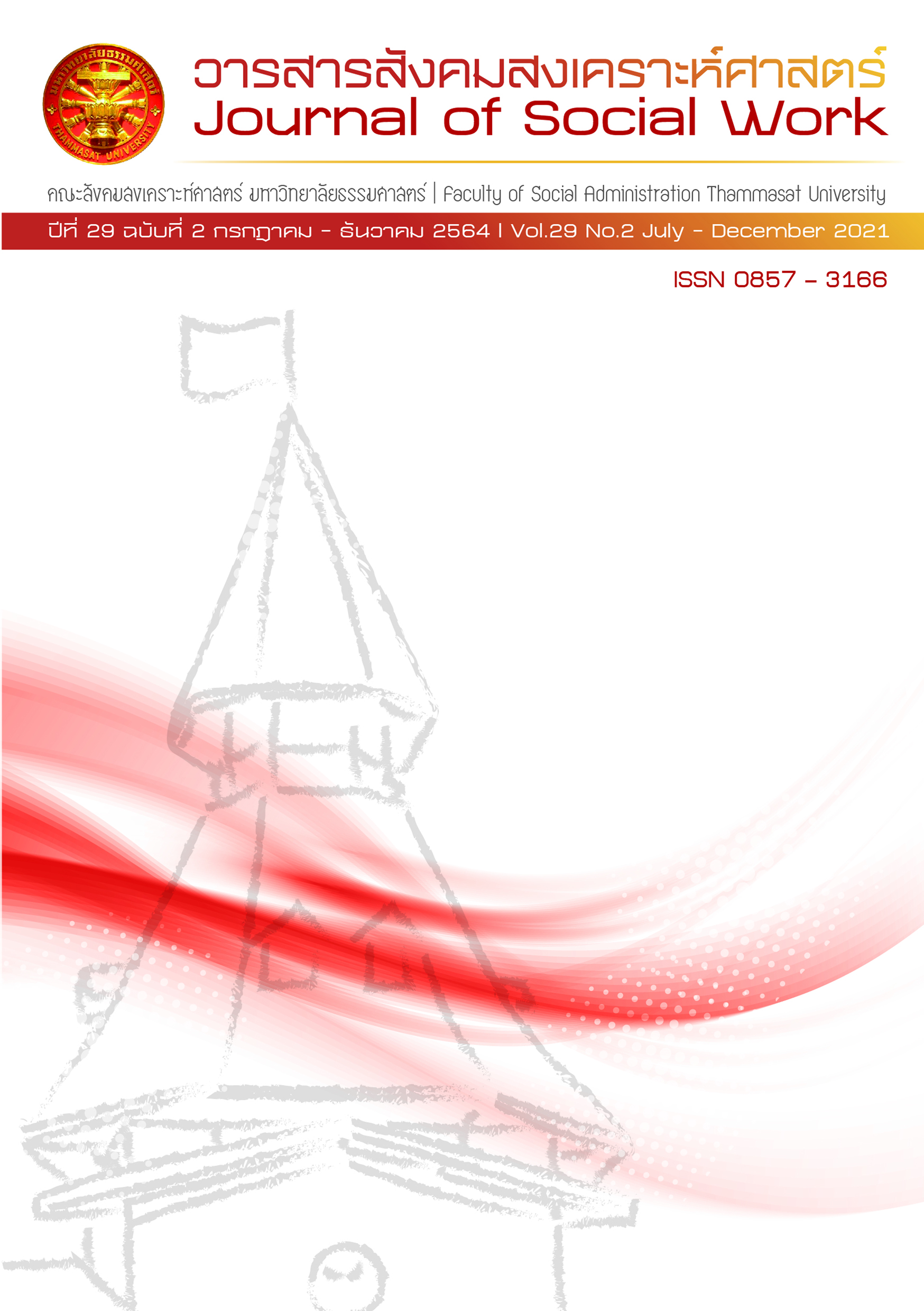Career Development Mechanism and Support for Women Experiencing Violence A Case Study of The Emergency Shelter of Association for the Promotion of the Status of Women
Keywords:
Career development mechanism and support, Women experiencing violence, Emergency shelterAbstract
This research is qualitative research with the following objectives: To study the mechanism and support of career development and the results of mechanisms and support for the career development of women experiencing violence. The research methods comprised of documentary research and field research from The Emergency Shelter of Association for the Promotion of the Status of Women. The samples are divided into two groups; the first includes eleven staff and the second includes two people who used to use the service at the emergency shelter. The research finds that The Emergency Shelter of Association for the Promotion of the Status of Women (1) has 4 mechanisms for women experiencing violence that facilitate the career development process more efficiently, consisting of Preparation Before Training, Client Needs Survey, Career Development, and Evaluation and Follow up. (2) has 4 means of support for women experiencing violence that facilitate the career development process more comfortably consisting of Psychological Support, Childcare Support, Career Counseling Support, and Additional Training and Knowledge Support, and (3) cases studies that used to use the service of the emergency shelter which reveal that they can overcome problems, experience behavioral changes for the better, and do not enter the cycle of violence. For career development, the case studies are not engaged in the main occupation according to the vocational training course but have brought the skills and abilities that have been acquired to carry out in additional occupations and use in daily life.
References
กรมกิจการสตรีและสถาบันครอบครัว. (2561). รายงานข้อมูลสถานการณ์ด้านความรุนแรงในครอบครัว สำหรับการรายงานตามมาตรา 17 แห่งพระราชบัญญัติคุ้มครองผู้ถูกกระทำด้วยความรุนแรงในครอบครัว พ.ศ. 2550 ประจำปี 2561. กรุงเทพฯ: กรมกิจการสตรีและสถาบันครอบครัว, กระทรวงการพัฒนาสังคมและความมั่นคงของมนุษย์.
กรมราชทัณฑ์. (2561). แผ่นพับศูนย์ประสานงานและส่งเสริมการมีงานทำ. สืบค้นจากhttp://www.correct.go.th/infosaraban/letter/filepdf/1522653846.pdf
ครูสอนศิลปประดิษฐ์. ครูสอนศิลปประดิษฐ์ ฝ่ายการศึกษาและฝึกอาชีพ สมาคมส่งเสริมสถานภาพสตรีฯ. (11 กุมภาพันธ์ 2564). สัมภาษณ์.
คุณนุช. (24 กุมภาพันธ์ 2564). สัมภาษณ์.
คุณพัศ. (17 กุมภาพันธ์ 2564). สัมภาษณ์.
จุฑามาส ครุธพุ่ม. (2549). การพัฒนาอาชีพของกลุ่มสตรีในศูนย์สงเคราะห์และฝึกอาชีพสตรีภาคเหนือ จังหวัดลำปาง. วิทยานิพนธ์ปริญญามหาบัณฑิต, คณะสังคมสงเคราะห์ศาสตร์, มหาวิทยาลัยธรรมศาสตร์.
เจ้าหน้าที่ฝึกอบรม. เจ้าหน้าที่ฝึกอบรม ฝ่ายการศึกษาและฝึกอาชีพ สมาคมส่งเสริมสถานภาพสตรีฯ บ้านพักฉุกเฉิน. (4 กุมภาพันธ์ 2564). สัมภาษณ์.
เจ้าหน้าที่ฝึกอาชีพ คนที่ 1. เจ้าหน้าที่ฝึกอาชีพ ฝ่ายการศึกษาและฝึกอาชีพ สมาคมส่งเสริมสถานภาพสตรีฯ บ้านพักฉุกเฉิน. (4 กุมภาพันธ์ 2564). สัมภาษณ์.
เจ้าหน้าที่ฝึกอาชีพ คนที่ 2. เจ้าหน้าที่ฝึกอาชีพ ฝ่ายการศึกษาและฝึกอาชีพ สมาคมส่งเสริมสถานภาพสตรีฯ บ้านพักฉุกเฉิน. (4 กุมภาพันธ์ 2564). สัมภาษณ์.
นักจิตวิทยา. นักจิตวิทยา สมาคมส่งเสริมสถานภาพสตรีฯ บ้านพักฉุกเฉิน.
(4 กุมภาพันธ์ 2564). สัมภาษณ์.
นักสังคมสงเคราะห์ คนที่ 1. นักสังคมสงเคราะห์ สมาคมส่งเสริมสถานภาพสตรีฯ บ้านพักฉุกเฉิน. (28 มกราคม 2564). สัมภาษณ์.
นักสังคมสงเคราะห์ คนที่ 2. นักสังคมสงเคราะห์ สมาคมส่งเสริมสถานภาพสตรีฯ บ้านพักฉุกเฉิน. (4 กุมภาพันธ์ 2564). สัมภาษณ์.
ผู้จัดการเคหะกิจ. ผู้จัดการเคหะกิจ สมาคมส่งเสริมสถานภาพสตรีฯ บ้านพักฉุกเฉิน. (11 กุมภาพันธ์ 2564). สัมภาษณ์.
ผู้ช่วยนักสังคมสงเคราะห์ คนที่ 1. ผู้ช่วยนักสังคมสงเคราะห์ สมาคมส่งเสริมสถานภาพสตรีฯ บ้านพักฉุกเฉิน. (18 กุมภาพันธ์ 2564). สัมภาษณ์.
ผู้ช่วยนักสังคมสงเคราะห์ คนที่ 2. ผู้ช่วยนักสังคมสงเคราะห์ สมาคมส่งเสริมสถานภาพสตรีฯ บ้านพักฉุกเฉิน. (18 กุมภาพันธ์ 2564). สัมภาษณ์.
สมาคมส่งเสริมสถานภาพสตรีฯ. (2564). แผ่นพับศูนย์การศึกษาและฝึกอาชีพ สมาคมส่งเสริมสถานภาพสตรี. สืบค้นจาก http://www.apsw-thailand.org/table.htm
หัวหน้าศูนย์เลี้ยงเด็กอ่อนและรักษาการหัวหน้าบ้านเด็ก. หัวหน้าศูนย์เลี้ยงเด็กอ่อนและรักษาการหัวหน้าบ้านเด็ก สมาคมส่งเสริมสถานภาพสตรีฯ บ้านพักฉุกเฉิน. (11 กุมภาพันธ์ 2564). สัมภาษณ์.
Bellah, R., Madesn, R., Sullivan, W., Swidler, A., & Tipton, S. (1996). Habits of the Heart. Berkeley: University of California Press.
Brown, C. Trangsrud, B & Linnemeyer, M. (2009). Battered Women’s Process of Leaving A 2-Year Follow-Up. Journal of Career Assessment, 17(4), 439-456
Brown, Steven D., & Brooks, L. (1991). Career Counseling Techniques. Boston: Allyn and Bacon.
Chronister, K. M., & McWhirter, E. H. (2003). Applying Social Cognitive Career Theory to the Empowerment of Battered Women. Journal of Counseling & Development, 81(4), 418–425.
Inkson, K., Dries, N., & Arnold, J. (2015). Understanding Careers (2nd ed.). London: SAGE.
Kiwassa Neighbourhood House. (2020). EMPOW3R Program. Retrieved from https://www.kiwassa.ca/our-services/empow3r-program/
L.I. Against Domestic Violence. (2020). Vocational Training and Financial Literacy. Retrieved from https://liadv.org/services/vocational-training-and-financial-literacy/
Lent, Robert W. (2005). A Social Cognitive View of Career Development and Counseling. Brown, Steven D., Lent, Robert W. (Eds.) Career Development and Counseling : Putting Theory and Research to Work. (p.101-127). New Jersy: Wiley.
Swanson, J., & Fouad, N. (2015). Career Theory and Practice: Learning Through Case Studies. California: SAGE.
Urban Resource Institute. (2020). Economic Empowerment. Retrieved from https://urinyc.org/program/economic-empowerment/
Wachter Morris, C., Shoffner, M., & Newsome, D. (2009). Career Counseling for Women Preparing to Leave Abusive Relationships. A Social Career Development Quarterly, 58(1), 44-53.
Downloads
Published
How to Cite
Issue
Section
License
The manuscripts published in the Social Work Journal is the copyright of the Social Work Journal, Thammasat University
Any article or opinion appeared in the Social Work Journal will solely be under the responsibility of the author The Faculty of Social Administration, Thammasat University and the editors do not need to reach in agreement or hold any responsibility.



